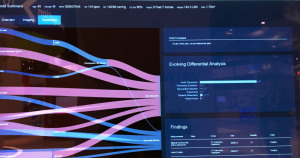by
John W. Mitchell, Senior Correspondent | December 06, 2016

Merge/Watson platform in
development, code name Avicenna
IBM Watson Health wowed clinicians and physicians at RSNA with a demo of Watson cognitive assistant applications currently in development.
One platform — planned for release in 2017 — discovers discrepancies in cases of aortic stenosis (AS). The cognitive peer review tool sorts through EHRs and flags AS cases in which the diagnosis code and the EHR problem list, and the clinical evidence in the physician’s case notes, do not match. Clinicians then have the final say in accepting or rejecting Watson’s recommendation.
"We're working across six business pillars and imaging is one of them," Kurt Hammond, VP, sales and marketing told HCB News. "We currently have 20 clinical and vendor partners within the Medical Imaging Collaborative, who we think will each bring unique value in teaching Watson, and will assist in developing solutions."




Ad Statistics
Times Displayed: 45316
Times Visited: 1411 Keep biomedical devices ready to go, so care teams can be ready to care for patients. GE HealthCare’s ReadySee™ helps overcome frustrations due to lack of network and device visibility, manual troubleshooting, and downtime.
AS is a common and serious heart valve disease, affecting 1.5 million Americans each year. According to IBM, a recent study found that nearly half of the diagnoses and findings from imaging studies and associated reports never make it into the problem list of billable diagnoses in a patient's EHR.
"Only half of AS patients are alive two years after diagnosis. It doesn't have to be this way ... if caught earlier," Dr. Ricardo Cury, FSCCT, director of cardiac imaging at Baptist Hospital of Miami, said in a statement. "Out of the gate the Watson cognitive tool could potentially provide big benefits."
Merge intrigued audiences with another common body part imaging procedure to benefit from big data and artificial intelligence: mammography. The Marktation work in progress allows the physician to label findings on an image using text or speech recognition. The text label is simultaneously stored on the image and pushed into the clinical report, helping to improve reading speed and accuracy.
According to IBM researchers, radiology images account for 90 percent of medical data sources and continue to increase every year. Most information still has to be extracted manually. Artificial intelligence can help reduce errors and allow radiologists to spend more time consulting with referring physicians and their patients.
IBM is also exhibiting caution to ensure that Watson platforms will play nice across existing systems.
"We know this has to be done without a forklift upgrade," Michael Klozotsky, Marketing Leader, Watson Health Imaging told HCB News. "No hospital administrator wants to have to replace their PACS system to accommodate a new quality platform. So all of our Watson partnerships must offer a vendor-neutral platform."

